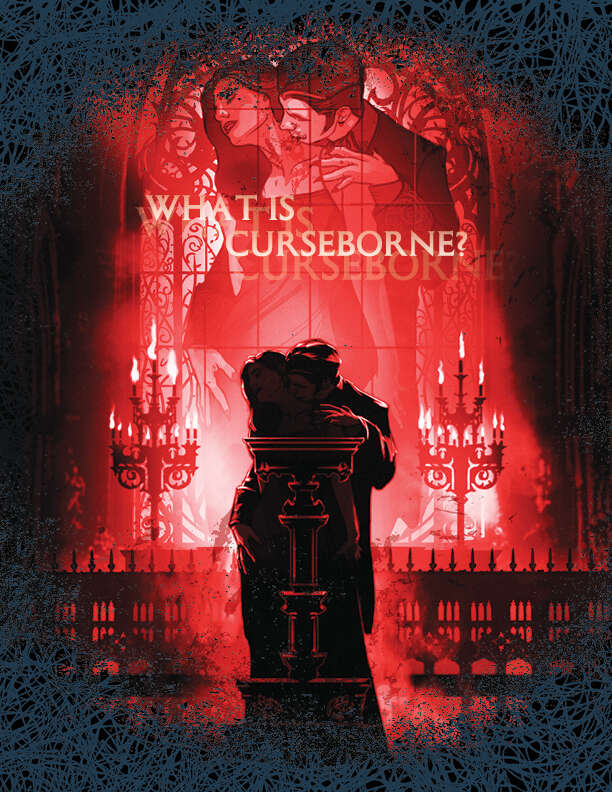Curseborne Begins! (In four hours)

Today’s the day! After a lot of teasing and reveals and sneak peeks and actual plays and an ashcan, today we launch the Curseborne Kickstarter!
And we’ve been thrilled with everyone who has been talking about it, pulling apart every little scrap of information and analyzing it to death (and, perhaps, beyond death). There’s been a lot of discussion about the game as a result, and we’ve been listening. So today I thought I’d take a breath before the rush rush rush of the campaign to talk a little bit about what’s changed.
(As a quick aside, the ashcan might still use outdated language, as well as some actual plays you’ll see now and in the coming weeks. There wasn’t anything big enough to justify updating all of those, but just be aware that what you see here and in the manuscript on Kickstarter will be the latest and greatest.)
Generally, when we work on a game for Onyx Path, we focus on getting it right and wait for feedback when everyone has had a chance to see the manuscript in context and note things that could be confusing, construed as problematic, or have negative results at the table. But Curseborne is special. It’s a big game, both in terms of our expectations for it, and how much production has gone into it. We’ve also been showing a lot more of it beforehand than we usually do. So while we normally prefer to funnel all our feedback into one place so our developers aren’t running all over social media just to stay on top of the discussion, just this once we decided to collate some of the great feedback we’ve gotten and make adjustments to the manuscript before the Kickstarter is live.
Here, in no particular order, are some of the more interesting changes we’ve made as a result!
- Take it as read that a whole slew of typos, minor typographical errors, and small edits were made throughout. We’ll still do a formal editing pass after the crowdfunder to catch any that remain, but we made a determined effort to make the manuscript as clean as possible.
- There were also a number of small changes that came up during the Storypath Ultra Core Manual campaign that Curseborne inherited. For example, a concern about one piece of the investigation system pointed not to an overhaul of that system, but rather a small rules adjustment that opened up more options for expanded coverage of investigations that a mysterious game like Curseborne definitely benefits from.
- There were some Edges which didn’t quite do what they said they did, or didn’t align with those small rules tweaks that happened to Storypath Ultra. We’ve addressed those.
- Spells are probably the biggest overhaul, making sure they all work well with each of the families and are all interesting in themselves without overlapping too much with other spells.
- Wicked successes and cruel failures were also clarified, as they were a source of confusion.
- We also changed when you should check for wicked successes and cruel failures, realizing that having them show up on every roll might get burdensome.
- In earlier drafts we had references to a singular, capital-C “Curse,” which was a remnant of an older perception of how curses work in the game. Those have been removed.
- “Places of deferment” have been renamed to the more interesting and evocative “loopholes.”
- We got some good feedback that the advice on personal torments was a bit vague, so we’ve provided more examples.
- Similarly, some people felt the advice of “play this family if you want to…” was at times a bit unclear, so we expanded on some of those.
- We added a new antagonist Quality (Locked Door) so that some adversaries can’t be possessed by the Dead.
- The number of curse dice you start with at the beginning of the session was in a counterintuitive place, which we’ve amended (it’s one, by the way).
There are also a lot of things we didn’t change, either because the perceived problem is solved by other context that hasn’t been made available yet, because the change would take the game in a direction we didn’t want it to go in, or the changes were purely subjective “I don’t like this” reactions that aren’t really things we can or desire to change.
That’s pretty typical of our more formal feedback and errata stages — we find that, on average, feedback tends to fall into rough thirds. One third of feedback is straightforward: Something is wrong, and there’s a clear fix, or the proposed fix is the correct one. One third is feedback where the problem isn’t quite where the playtester thinks it is, but it helps us find an actual problem that resolves the same symptom (the reference I made to the investigation system update is a good example of that). The final third of feedback isn’t actionable, and if after consideration it doesn’t lend itself to one of the other kinds of fixes, we discard it.
Actually, speaking of our more formal feedback stage, that’s where we’re at now. With the campaign running, we have to focus our attention in a lot of other places, so going forward we’re going to point people to the feedback form you’ll find once you back the campaign. Any thoughts, concerns, or notes about the manuscript will have to go in there for consideration. As I mentioned above, this was a one-time exception we made just because we wanted Curseborne to be the best game possible at launch, but it was exhausting to stay on top of, and it’s not something we can do on a regular basis. So if you have any further notes, please don’t leave them as a comment here. Just hang on to them, and you can use the form as soon as the campaign goes live.
We’re incredibly proud of our accomplishment, and we’re excited to see what the future holds for Curseborne. Here’s hoping our little cursed moth can find the light of success in the coming weeks!

